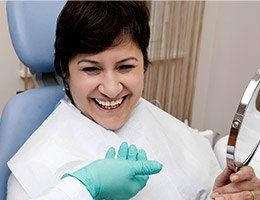TMJ Therapy – Ann Arbor, MI
Relieve Jaw Pain with Neuromuscular Dentistry
Our supply of technological services doesn’t stop at just the health of your teeth! If you constantly find yourself plagued by TMJ pain, such as a stiff, sore jaw and headaches, we can use computerized services such as our TENS machine, K-7 muscle scanning unit, and Tekscan sensors in order to properly diagnose your condition and determine the best course of action. Dr. Olsen and his well-trained team will use these technologies to determine an option for TMJ therapy in Ann Arbor, MI that is specifically designed to give you healing, reduced inflammation, and the best resolution of your symptoms.
Staying on the cutting-edge of dental care helps us provide relief from TMJ pain and chronic headaches. Few people realize that jaw problems can lead to a wide variety of issues in and around the head and neck region. Issues with the temporomandibular joint, otherwise known as the TMJ, can cause pain in the head, neck, and shoulders. TMJ pain, muscle aches, and headaches can interfere with your ability to move through life comfortably, robbing you of the ability to concentrate and even enjoy your favorite activities. However, with our neuromuscular approach to treatment, we can alleviate both TMJ pain and headaches and have you happily getting back to the things you love in no time.
Neuromuscular Dentistry

Neuromuscular dentistry has the ability to alleviate a variety of problems associated with the TMJ, including:
- Headaches
- Grinding or clenching
- Earaches
- Neck, back, and shoulder pain
- Pain in the teeth or behind the eyes
Diagnosis & Treatment

The first step in any TMJ treatment plan is to determine what is actually causing the pain. Is it arthritis in the joint? The result of an injury? A misalignment of the bite? Determining this answer will help us figure out the right solution. Using our K-7 scanning unit, we’ll be able to find the perfect position for your jaw, and then Dr. Olsen will help you achieve it through a variety of non-invasive treatments.
Equilibration/Occlusal Adjustments

When the bite is misaligned, this can cause the jaw to make small adjustments whenever you open and close your mouth. These can put quite a bit of strain on the joint and muscles, leading to TMJ pain. With an equilibration/occlusal adjustment, we can slightly reshape a few key teeth so that the bite is perfectly aligned. This will allow the jaw to reach its natural resting position, which should help relieve any tension and pain.
Bite Splints and Orthotics

Phase 1 treatment -
This phase of TMJ treatment usually involves the use of either a Bite Splint or a custom made Orthotic. These devices can be used to address a variety of TMJ-related problems. Each splint is custom-made for every patient, and they work by slightly shifting the jaw into a physiologic rest position. Over time, this will enable the muscles and joint to heal and find this new, healthier orientation on their own. Some patients are able to stop wearing the splint after just a few months, though some need to continue wearing it in order to keep seeing results.
Phase 2 treatment -
This happens after Phase 1 treatment has been successful in getting rid of your pain and other symptoms. It can involve use of a night time appliance, orthodontics, and even reconstruction of the teeth to settle into the new physiologic bite for a most permanent correction. Dr. James Olsen will discuss your options and help you achieve the course of treatment that is right for you.
TENS (Trans Epidural Neural Stimulation)

A TENS unit is a muscle stimulator used to create a physiologically relaxed state of the muscles. It provides a small impulse to the jaw, neck and shoulder muscles using just a 9 volt battery. It is a valuable tool in relaxing the muscles so we can achieve a bite registration in a physiologic rest position. it is also useful in the treatment of some types of TMJ dysfunction and associated pain.
Phase One TMJ Therapy

If you live with reoccurring jaw pain, Dr. James Olsen can give you the relief you need with Phase One TMJ therapy. He combines his training and qualifications in the area with the latest technological advancements to provide noninvasive and effective solutions to improve the function of your temporomandibular joint. The conservative treatments are recommended before turning to surgical interventions. Often, Phase 1 therapy is all that is needed to stop your TMJ pain. Dr. Olsen creates the customized treatment plan you need to restore your quality of life.
Learn More About Phase OnePhase Two Treatment for TMJ Dysfunction

Non-surgical treatments for TMJ disorders are often effective for improving the quality of life for most of our patients. Unfortunately, conservative options may not be enough for some people. As a result, they may choose Phase 2 treatment for TMJ. This involves correcting bite problems (malocclusion). There are a couple of different approaches that can be used, such as making minor alternations to the teeth, crowns, or surgery. Dr. Olsen performs an extensive consultation and explains all your treatment options to help you make the best choice.
Learn More About Phase TwoTMJ Treatment FAQs
Will my TMJ problem go away on its own?
Unfortunately, a TMJ issue isn’t the kind of thing that will heal on its own and go away with time. TMJ dysfunction is an ongoing problem that causes symptoms in the short term that will actually tend to get worse if treatment isn’t applied. That’s why we recommend people come to see us for a screening as soon as they think their TMJ might be causing trouble. Waiting will only allow the pain and discomfort to grow, and we certainly don’t want that!
How long does TMJ treatment take?
No two cases of TMD are the same, so the treatment process can vary timewise. Determining the root of the issue can sometimes require multiple appointments to rule out all other possible causes, and then we go through a process of using more conservative treatments before progressing to complex ones based on how the patient responds. For some patients, we can take care of everything in one or two appointments, while others might have to come in several times over the course of weeks. Fortunately, even if initial treatments aren’t the ultimate solution, they do tend to provide some immediate relief, meaning a patient will start feeling better relatively quickly.
How long do the results of TMJ treatment last?
The rest of a patient’s life in most cases! The goal of TMJ treatment is to correct the structural issues that are at the heart of the imbalance affecting the jaw joint. However this is done, the newly functional joint should remain symptom and pain-free for decades to come. A patient may need to come in occasionally for updates on any dental work or appliances associated with their TMJ treatment. If a patient is dealing with arthritis, this will require ongoing management, but it should be relatively easy after the first round of diagnosis and treatment.
Can I use insurance to help pay for TMJ treatment?
Yes, many dental insurance plans can be used to pay for treatments associated with TMJ care, but the coverage isn’t consistent across all plans and all providers. While most plans offer benefits for treatments like crowns, fillings, and splints, some may not cover procedures like surgery or TENS. When you come to see us for the first time, we’ll discuss all of these details with you so that you know what to expect when it comes time to pay. If needed, we can discuss financing options as well.

